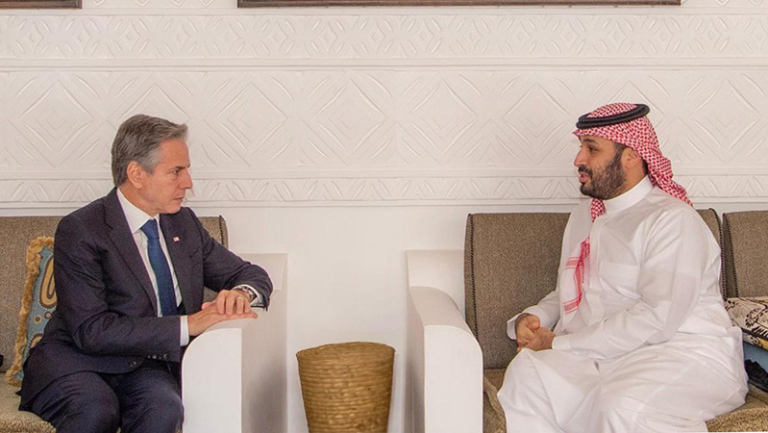
Whether Hamas’s October 7 assault has ended whatever prospects existed for forging diplomatic relations between Israel and Saudi Arabia remains to be seen. The assumption that a second key goal of the attack was to get Saudi Crown Prince Mohammed bin Salman Al Saud (MBS) to back away from a deal to recognize Israel may be true. But it is also possible that a protracted conflict in Gaza that invites a wider regional war—a prospect that now seems likely—could get Saudi Arabia’s de facto leader to revive the “Arab Peace Initiative” (API) that deceased Saudi King Abdullah bin Abdelaziz proposed in 2002. After all, there was a time not so long ago when some experts speculated that the initiative might “supplant” the Abraham Accords by providing an umbrella for a consensus of Arab governments, one that would address the key issue that the accords sidestepped: the creation of a Palestinian state living in peace with Israel.
But such a step faces significant hurdles, not least of which is that no matter the outcome of Israel’s unfolding military campaign in Gaza, Hamas’s success (which surprised even its leaders) in breaching Israel’s defenses and spreading mayhem and death in southern Israeli towns and kibbutzim has made it and Islamic Jihad the paramount symbols in the Arab world of Palestinian resistance to any territorial compromise with Israel. Moreover, as Israel’s incursion creates massive civilian casualties, it is galvanizing the Arab street from Casablanca to Kuwait City, thus making it difficult for any Arab leader to make the case for revising a wider Arab initiative.
And yet MBS might try, especially if he concludes that doing so would help consolidate his personal power before his eventual ascension to the throne. Such a move would represent a not insignificant change for the prince. After all, he had already signaled to the Biden administration that securing US support for a nuclear power plant under the umbrella of US security guarantees is far more important to the Saudis than conditioning the normalization of relations with Israel on a demand that Netanyahu’s government would surely reject—namely, to renounce Israel’s intended annexation of the occupied West Bank. Hamas’s assault may leave MBS with a newfound appreciation of the Palestinian issue. But his credibility as an interlocutor for the Palestinians has been tarnished by his lack of enthusiasm for embracing a cause that never topped his list.
MBS Wins Either Way
Reflecting on the implications of Hamas’s assault for Saudi Arabia, and for MBS in particular, one analyst argues that while the attack may have ended—or at least suspended—efforts to secure Israeli-Saudi normalization, this outcome would not represent a strategic or political loss for MBS. By changing the “discussion to MBS and Israel, away from MBS and Khashoggi,” he suggests, the crown prince got what he wanted: he has rehabilitated his image “just by talking.” Deal or no deal with Israel, MBS wins.
However cynical it may be, this assessment is not off-base. In the rarified circles in which MBS thrives, where high-level diplomatic discussions and frequent appearances on global news programs fill his days and weeks, talking is a sign that he is in the game and that he counts. But knowing this, when it comes to the question of normalizing relations with Israel and other hot-button issues, he has been careful with his talk. Thus in a September 20 interview with Fox News, he noted, “For us, the Palestinian issue is very important, we need to solve that part.” Yet he avoided any direct mention of conditions while adding that, “We hope that we will reach a place that eases the life of the Palestinians.” There was no reference to the Arab Peace Initiative or a Palestinian state. Reiterating his hope that the ongoing discussions would give the Palestinians a “good life,” he showed optimism about the course of talks with the Biden administration.
From a negotiating standpoint, this caution may have made sense. From his own vantage point, it also makes sense that MBS sees politics through the material lens of securing a “good life.” But from a diplomatic standpoint, his words were potentially problematic, as they suggested that the crown prince might be demanding less of the Israeli government and its leaders than the Biden administration. In late August, Secretary of State Anthony Blinken reportedly told Israel officials that they were “misreading the situation” if they thought that Israel would not have to make major concessions to the Palestinians for any deal with Riyadh. On September 13, he asserted that Saudi leaders told him that the “Palestinian piece is going to be very important,” thus seemingly anticipating the language that MBS used a week later in his interview with Fox News.
Hamas’s assault may leave MBS with a newfound appreciation of the Palestinian issue. But his credibility as an interlocutor for the Palestinians has been tarnished.
Coordinated or not, these statements set off alarm bells, not in Israel, but in the United States. In a novel situation, several liberal Jewish organizations and a group of 20 Democratic Senators echoed Thomas Friedman’s September 5 opinion piece, in which he urged the administration to “just say no” to a Saudi-Israel deal that didn’t include an Israeli commitment to halting annexation and stopping actions that would preclude a Palestinian state, such as expanding settlements. This campaign was also tied to the stand-off between the Israeli government and the opposition regarding Israel’s “judicial reform” law. The authors of these demands knew that by insisting on linking Saudi-Israeli normalization to the Palestinian issue, the White House would make Israeli Prime Minister Benjamin Netanyahu navigate between two choices, one of which would probably lead to the collapse of his government. Thus the specter of US Jewish groups, Democratic senators and a prominent New York Times columnist delivering a message that MBS deliberately fudged, and that the administration seemed hesitant to place at the center of its talks with Israel and Saudi Arabia.
Pulling Victory from the Jaws of Defeat?
It is not unreasonable to assume that in the wake of the Hamas assault, MBS might talk his way out of an explosive situation that for the moment threatens to undermine Israeli-Saudi normalization, but could upend the entire superstructure of the Abraham Accords. If, in addition to producing a humanitarian crisis and thousands of civilian deaths, a prolonged Israeli incursion into Gaza triggers a wider regional war, the leaders of Morocco, the United Arab Emirates, and Bahrain might freeze their relations with Israel. This would be an enormous setback for the Biden administration, as it has bet nearly its entire Middle East policy on sustaining and expanding the accords. Since such an outcome would also put MBS in a tight spot, it is reasonable to expect that he, his ministers, and the semi-official Saudi press are getting busy revising the crown prince’s talking points in ways that emphasize his commitment to the Palestinians, thus perhaps setting the stage for an effort by him to dust off the 2002 Arab Peace Initiative.
Indeed, it appears that the stage is already being set for such a shift. Careful not to get ahead of MBS, on the first day of Hamas’s attacks, the Saudi Foreign Ministry issued a statement that the kingdom was “closely following the developments of the unprecedented situation between a number of Palestinian factions and the Israeli occupation forces.” Foreign Minister Faisal bin Farhan Al Saud then had a phone call with US Secretary of State Antony Blinken, which according to the ministry noted “the kingdom’s rejection of targeting civilians in any way and the need for all parties to respect international humanitarian law.” Taking the message one small step forward, the editor of Saudi-owned newspaper Al-Sharq al-Awsat said that “Israel’s hubris has pushed it to miss several opportunities.” But as the summary of Saudi responses from which the above statements are all drawn shows, these remarks largely steered clear of Iran, and did not, of course, mention MBS’s recent observation about improving the lives of Palestinians.
Echoing this tactical caution while moving the needle forward a little, Hudson Institute Senior Fellow Mohammed Alyahya noted in a Washington Post editorial that MBS’s Fox News interview showed “his country’s commitment to easing the life of Palestinians through negotiations for normalization,” but prefaced this observation by stating that Saudi officials remain convinced that the “API is a solid foundation from which good-faith negotiations can proceed.” That position, he added, was also set out on September 23 at the UN General Assembly by the Saudi foreign minister. Thus the crown prince’s allies recast MBS’s tepid words on the Palestinians while placing his outreach to Israel under the umbrella of the API, a plan that is rejected by both Hamas and Benjamin Netanyahu’s government.
Beyond the Dream Wagon
These rejections reflect theocratic worldviews about Palestine that have been embraced by both Hamas and at least two ministers in Netanyahu’s government: Itamar Ben-Gvir and Bezalel Smotrich. But this spirit of rejectionism is less the product of ideology or faith than an outcome of a stalemated conflict. That standoff has produced desperation among Palestinians who feel powerless, and a sense of either resignation or arrogant defiance among Israelis, born of the misconception that Israel could protect its security by sustaining the status quo or advancing the annexation of the West Bank.
That standoff has produced desperation among Palestinians who feel powerless, and a sense of either resignation or arrogant defiance.
But the current sorry state of affairs was also a product of other factors, including the genocidal language of Iran and its allies in Lebanon, the apathy of Arab leaders, and the decision of the Biden administration to hitch its Middle East policy to a dream wagon of Arab-Israeli harmony that ignored the Palestinian issue. This was a fantasy because while the leaders of the UAE, Bahrain, Morocco, and Saudi Arabia do not worry about democratic accountability, the sentiments of their people do matter. However charming and even welcomed, all the interfaith dialogue and prayer in Abu Dhabi or Riyadh will not produce conditions that will help Palestinians and Israelis toward some kind of imperfect but just peace.
This lesson will now get a new hearing from Arab leaders, from the Biden administration, and perhaps eventually, from a new Israeli government. But the White House will have to make it clear to MBS and other Arab leaders that proposals to revive a wider Arab Peace Initiative must be based on much more than talk, or for that matter, on the kinds of diplomatic hedging that MBS has pursued with a hardline Iranian government that rejects Palestinian-Israeli peace of any kind. Enormous financial and institutional resources, as well as a display of political will the likes of which have not been seen in the region for decades, will all be required to create any hope of moving beyond this apparently hopeless moment.
The views expressed in this publication are the author’s own and do not necessarily reflect the position of Arab Center Washington DC, its staff, or its Board of Directors.
Featured image credit: SPA

